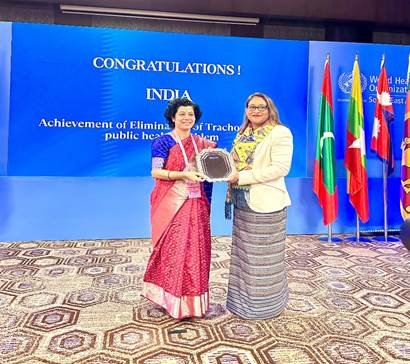India has eliminated trachoma as a public health problem, becoming the third country in the South-East Asia region to achieve this milestone, as announced by the World Health Organization (WHO). The certification was presented to Aradhana Patnaik, Additional Secretary and Mission Director of the National Health Mission, during the WHO South-East Asia Regional Committee meeting in New Delhi on October, 2024.
Trachoma, a contagious bacterial eye infection caused by Chlamydia Trachomatis, was once a leading cause of blindness in India, especially in underprivileged areas. Left untreated, it can cause irreversible blindness. Globally, around 150 million people are affected by trachoma, with 6 million at risk of serious complications.
India’s efforts to eliminate trachoma began in 1963 with the National Trachoma Control Program, later integrated into the National Program for Control of Blindness (NPCB). By 1971, blindness due to trachoma stood at 5%, but through sustained efforts, it dropped to less than 1%. The WHO’s SAFE strategy (Surgery, Antibiotics, Facial cleanliness, and Environmental improvement) played a key role in combating the disease, and India was declared trachoma-free by 2017.
India continued its surveillance through the National Trachomatous Trichiasis (TT only) Survey between 2021 and 2024. WHO reviewed these reports, leading to India’s official certification for trachoma elimination.
